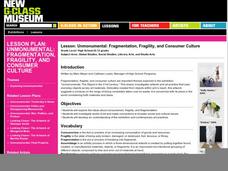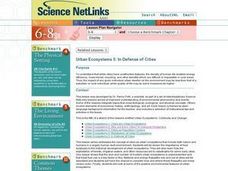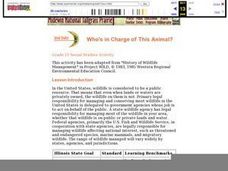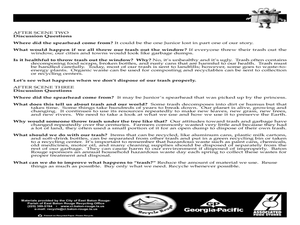Curated OER
When Art's a Craft
What would it be like to restore modern works of art? By acting as modern art conservators, learners assess the first-hand difficulties faced in restoration efforts. In addition, they create modern art pieces from random materials. Then,...
Curated OER
Lesson: Unmonumental: Fragmentation, Fragility, and Consumer Culture
Looking at art is the first step to analyzing it. And, if you can analyze art, you can analyze anything. Kids examine several pop art pieces that represent consumerism in modern culture. They discuss multiple facets of each piece and...
Curated OER
Farmers - Caretakers of the Land
Students explore resource management, specifically farming. After reviewing vocabulary words, groups of students explore what is conserved by each practice. They compare and contrast responses. Students describe farming procedures which...
Curated OER
Urban Ecosystems 5: In Defense Of Cities
Students explain that while cities have unattractive features, the density of human life enables energy efficiency, mass transit, recycling, and other benefits which are difficult or impossible in rural areas. This is the fifth in an...
Curated OER
Who's in Charge of This Animal?
Eleventh graders study wildlife management and identify the appropriate government agencies that are in charge. They examine different wildlife management techniques. They write a letter showing interest in the activities of one of the...
Curated OER
Japanese Haiku and the American Experience
Twelfth graders research the history to Haiku Poetry. They read classical haiku to comprehend their special sensibility and form. Students encounter the Buddhist philosophical background of this poetry and its roots. They write original...
Curated OER
Furbearers of Illinois
Students study fur bearing animals of Illinois. They research a specific furbearer (it's habitat, diet, current hunting regulations regarding the animal, conservation organizations that help the animal, etc.) and give a presentation on...
Curated OER
Reclamation and Recycling
Students examine the many uses of mined lands after reclamation has been completed and discover the importance of recycling finding the difference between manufacturing with recycled materials and newly extracted materials.
Curated OER
Reclamation and Recycling
Young scholars learn the importance of plants and animals, ecosystems and habitats... and see how these factors guide mining reclamation projects. They then discover the importance of recycling, and the difference between manufacturing...
Curated OER
Nonprofit Environmental Groups
Young scholars examine the importance of nonprofit organizations when it comes to the environment. They discover how to evaluate different organizations. They research different organizations and present their findings to the class.
Curated OER
Quality of Rice
Sixth graders research how farmers irrigate, harvest, and keep high standards of rice. In this farming instructional activity, 6th graders discover how rice, wheat and soy beans are farmed. Students make a chart showing the similiarities...
Curated OER
Fitting Trash into Yesterday: A Fifth Grade Activity
Fifth graders explore the concept of waste management. In this recycling lesson, 5th graders discover the history of waste management and discuss how the U.S. should respond to the issue of ever-increasing waste.
Curated OER
Water and Ice
Students observe what happens to water as it goes from a solid to a liquid. In this exploratory lesson plan students gain an understanding for the water cycle while working in groups observing what happens to water as it changes state.
Curated OER
Methods of Mystery
Students utilize the scientific method to discover the age of an item. In this historical dating lesson plan, students compare and contrast a 400 year old cabinet to one made within a few years by using carbon dating. Students complete...
Curated OER
Sow the Seeds of Victory! Posters from the Food Administration During World War I
Students engage in a class analysis of posters, responding to each of the worksheet questions. They identify the similarities and differences between the posters.
















